Marking the end of the Week of Prayer for Christian Unity, clergy and parishioners from multiple denominations gathered at St. Andrew’s Presbyterian Church in downtown Ottawa on Jan. 22 for an early evening worship service centred on this year’s theme “Do good; Seek justice” from Isaiah 1:17. Twin reflections offered inspiration with examples of what churches can accomplish when they work together and a challenge to do more.
The service began with an acknowledgement that the service was being held on the unceded and unsurrendered territory of the Anishinaabe Algonquin Nation, the traditional keepers and defenders of the Ottawa River Watershed.
The service featured readings of five stories of racial injustice in Canada:
- The Rev. Chung Yan Lam, a Lutheran pastor who is associate incumbent at All Saints Westboro Anglican Church, read from Phyllis Kretschmer’s account reported by CBC of her time at the Marieval Residential School.
- The Rev. Dr. Karen Dimock, the minister of St. Andrew’s Presbyterian Church, read the story of Viola Desmond’s fight against racism and segregation in Nova Scotia.
- Carol Fairbrother, a local Lutheran volunteer, read from the story Jade Nayler shared in a CBC story of her father Ging Gar Chew who arrived in British Columbia from China in 1919 and had to agree to pay a $500 head tax. The tax was replaced in 1923 by the Chinese Exclusion Act, which meant he could never bring his family here.
- Ute Gerbrandt from the Ottawa Mennonite Church read from a CBC report on how rampant anti-Semitism led to rules that Jewish people could not rent or own resort properties on Lake Winnipeg before and during the Second World War and made it almost impossible for Jewish people to immigrate to Canada
- John Perkin of the Ottawa Baptist Association read from the story of Tamotsu (Tam) Nakazawa published in the Terrace Standard. Nakazawa was born in Canada but was among the 20,000 Japanese interned during the Second World War.
The stories were followed by two reflections. The first was from Ed Bianchi of KAIROS, an ecumenical organization that works for ecological justice and human rights. He offered some inspiration for churches and faith-groups who want to “do good and seek justice” from his experience.
While he was a student doing his master’s degree in film and environmental studies in Toronto in the 1980s, he made a documentary. He chose to feature the Lubicon Cree in Northern Alberta, a group who had maintained much of their traditional life in their remote territory until the arrival of the oil and gas industry and who then felt the full impact of colonialism in the space of one generation.
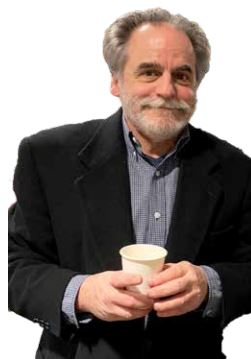
When Bianchi returned to Toronto, he and another man who had been in the region studying an outbreak of tuberculosis, created Friends of the Lubicon, a support group directed by the community. “Our goal was to raise awareness of the challenges this small group was facing,” he said.
Churches and faith groups were also supporting the Lubicon through an organization called Project North. “With literally a half a dozen people, they managed to organize speaking tours and media engagement for the Dene and other Indigenous communities in the area in the late 70s, early 80s,” said Bianchi. “If you were around at that time and you heard about the Dene and the Mackenzie Valley pipeline, it was most likely because of a Project North-organized event. That was churches creating space for Indigenous voices to be heard,… and it was because of the efforts of Project North and the churches that were part of Project North that the government commission, the Berger inquiry, then put a moratorium on development and essentially stopped the project from going ahead.”
Within a few years, that tiny group of activists had more than 120 regional groups across Canada. Bianchi said it grew so fast that it essentially imploded, but the Aboriginal Rights Coalition rose from its ashes, with Indigenous people having a much stronger voice and presence in the coalition.
In 1988, the Alberta government granted Japanese paper giant Daishowa rights to timber on 29,000 sq. km of land that encompassed the Lubicon land claim. Daishowa sued Bianchi’s group Friends of the Lubicon. “They said what we were telling people wasn’t true.
We won that court case, and it was after we won the court case that they negotiated an agreement with the Lubicon,” he said. “And we were able to go court and be victorious because of the support we were getting from the churches through the Aboriginal Rights Coalition.”
Bianchi became national co-ordinator of the coalition in 1995. In 1996, the Royal Commission on Aboriginal Peoples released its final report with 440 recommendations in 5,000 pages. The coalition’s executive, which included Indigenous peoples, did not want that report to be forgotten, another dusty tome on a shelf. So, they created an exercise to help people remember the major themes and understand the history — the Blanket Exercise.
“That exercise grew from this tiny workshop that would happen in church basements and occasionally in schools to this huge project that in the last year before COVID was delivered to over 30,000 by a network of facilitators, most of whom are Indigenous facilitators, elders and knowledge keepers,” said Bianchi.
“KAIROS represented an opportunity for these churches to keep working together on social justice and human rights….KAIROS works globally on issues of racism, discrimination and on the impact of colonization,” he explained. “There were Blanket Exercises developed that reflect the experience of Indigenous Peoples in Australia, on colonized peoples in Guatemala, Ecuador and the Philippines. These are all examples of the impact that the churches have had on this ongoing struggle for justice.”
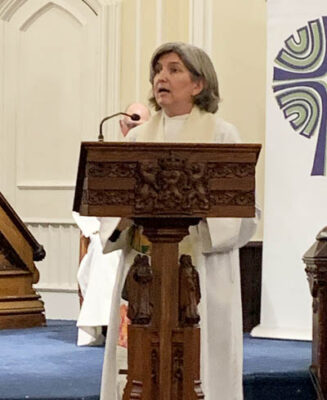
a rousing call for change:
Do Good. Seek Justice. Let’s
write some new stories.
The Rev. Monique Stone, incumbent of Julian of Norwich Anglican Church, challenged listeners to carry that work and energy into present problems.
She began by acknowledging that she spoke “as a white woman in a place of privilege who attempts to navigate the waters of allyship in my own context.” She shared that her own journey of allyship started in the diverse neighbourhood where she grew up but has been shaped most deeply by witnessing the racism experienced by her beloved four nieces and nephews whose fathers are from Jamaica.
Then, turning her focus to the church, she issued a rousing call for change: (excerpted)
“Do Good. Seek Justice. A cry of hope if we are willing to acknowledge that we have a racism problem in our predominately white churches and that God is calling us, here and now, to do the hard, uncomfortable work that is needed to write new stories,” she said…
What an amazing story it would be if I was not the person speaking to you today. That racialized women and men felt safe in these spaces; safe to speak, safe to voice truth and experience, and confident that their story telling would actually lead to action.
What an amazing story it would be if churches and church governance actively acknowledged that if we do not have diverse representation; active representation not just tokenism, that we will not be able to reflect the kingdom that God seeks to reveal in this world.
What an amazing story it would be if white people could figure out how to be effective allies; not saviours. And how amazing it would be if we realized that in our ally-ship journey we will mess up and that we need good trusting relationships with each other in which we as allies can ask questions and that as we stand behind those who are leading that they can turn around and tell us the hard truths and speak safely when we mess up.
What an amazing story it would be if micro-aggressions and blatant racism stopped happening in churches. That you no longer heard someone jokingly saying they cannot pronounce a name. Or that no one asks a person of colour ‘where are they really from’ …
What if we stopped siloing cultural differences away from the white normative …. You know when the 10 a.m. service is nice and British, but the weekday service has all the black music… what if we could tell the story of the ‘whole people of God’ in one place at one time… with all kinds of different music and accents and styles.
Think of a story that we would tell our children about the time when we realized being complicit in systemic racism was no longer acceptable and though even though we didn’t know exactly how to change it we just took that first step in noticing and acknowledging with a commitment to doing something.
What an amazing time to be the church. All of us in all of our different ways. …We have a God given opportunity to enter into this time of great, transformative, hard and difficult, life-changing work that has the capacity to impact our collective and individual abilities to see the kingdom of God fully revealed in our communities, our places of worship, our societies, our families, and in our own discipleship.
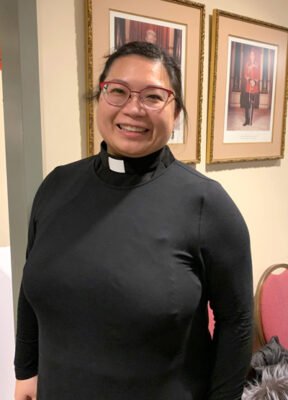
The Rev. Chung Yan Lam is a Lutheran (ELCIC) pastor serving as the associate priest at All Saints Westboro Anglican Church.
She is the Lutheran representative and vice-president in the Christian Council of the Capital Area and also serves as a vice-president of the Canadian Council for Churches. She worked with Josh Zentner-Barrett, music enlivener, to create the unique liturgy for the service based on the World Council of Churches resources. “I love doing this. Every year I look forward to doing it,” she told Crosstalk. “It’s fun for me as a Lutheran [serving] in the Anglican Church because … that’s my most comfortable space – [in full communion]. The broadness of the expression of our faith isn’t just one Sunday a year.”
She added that she is trying to involve more younger people and foster a new generation of ecumenists.
The Rev. Chung Yan Lam worked with Josh Zentner-Barrett to create the event’s unique liturgy.
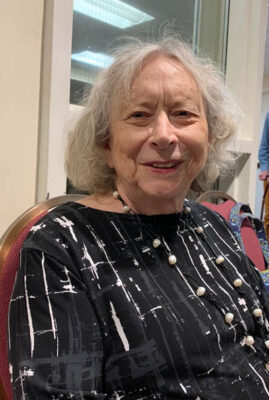
Janice Horton
(St. Thomas the Apostle)
“The stories were very moving. …I myself have come away with a sense of more understanding and also of peace. It was good to see so many people from different denominations.
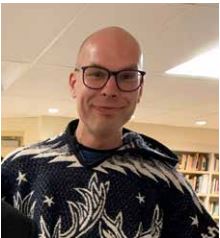
Jon Paquet
“What brought me here today [was] a recommendation from friends. I liked the music. I liked the rock, the connection to the water [Indigenous elements in the service]. I believe in the Creator, the Great Spirit, God,…to me, it’s all more than what we see…
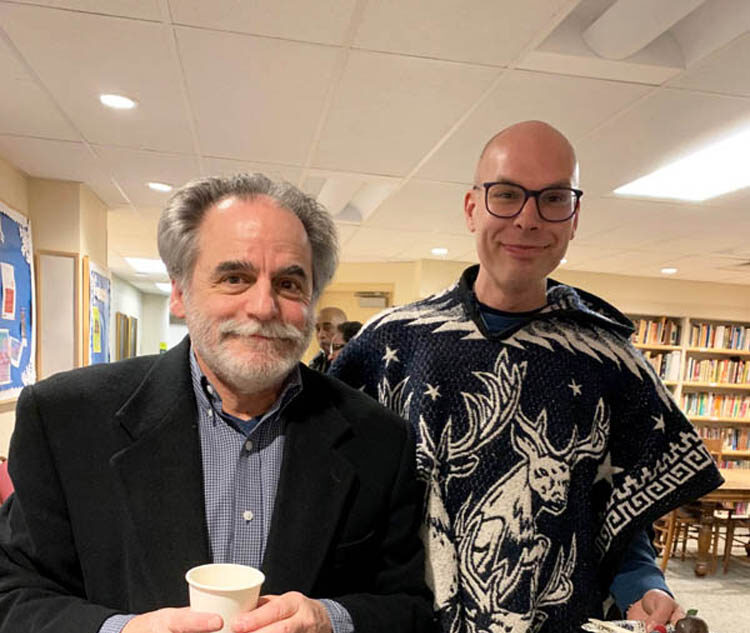

Week of Prayer for Christian Unity annual service to be celebrated at Saint Paul University on Jan. 22